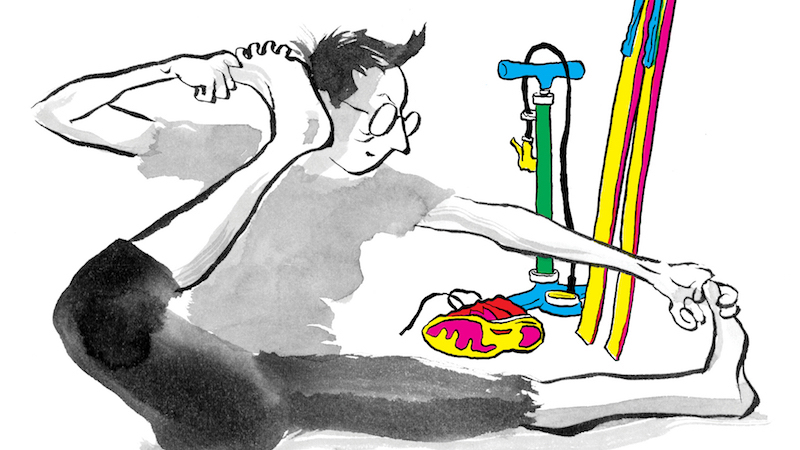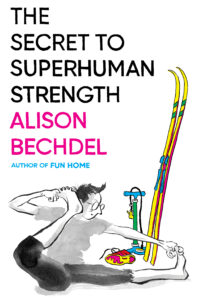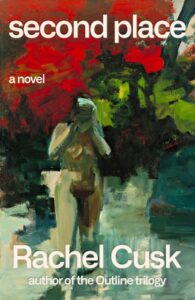
Our quintet of quality reviews this week includes Parul Sehgal on Alison Bechdel’s The Secret to Superhuman Strength, Hermione Hoby on Jhumpa Lahiri’s Whereabouts, Leslie Jamison on Susan Taubes’ Divorcing, Dwight Garner on Rachel Cusk’s Second Place, and Zachary Siegel on Patrick Radden Keefe’s Empire of Pain.

“Color? It’s the first sign that something new is afoot in a book full of familiar flourishes: the intertextuality (Proust and Joyce provided scaffolding for Fun Home as Kerouac and Margaret Fuller do here); the devotion to therapeutic homilies cut by sardonic asides; and the figure of Bechdel herself, drawn as a bit of a cross between Tintin and Waldo, vibrating with anxiety, doing her best to flee herself on bike or skis or simply on foot … Virginia Woolf wrote that she wanted to go beyond the ‘formal railway line of sentence’ to depict how people actually feel, dream and think—’all over the place.’ Bechdel is so associated with her material—her father’s possible suicide; her coming-out story, which she juxtaposed in Fun Home with her father’s furtive affairs with men—that her artistic and technical ambitions are often overlooked. Like Woolf, she is preoccupied with depicting the texture of thought and memory—their ambushes and heretical swerves … The real problem of this new memoir is stranger: How does a writer so fond of depicting thought and argument, dreams and recursive therapy sessions depict what lies beyond the mind? How does a writer with such an intricate visual and narrative style unravel her attraction to exertion and difficulty?”
–Parul Sehgal on Alison Bechdel’s The Secret to Superhuman Strength (The New York Times)
“Lahiri in her sedulousness can make a reader feel soothed; one trusts that one is in good, responsible hands. She can also make a person feel like a fidgety overgrown child being told— wordlessly, decorously—to please lower their voice and sit still … my thoughts drifted to Animal, that most misunderstood and mistreated of Muppets. You might recall that the poor creature with his shaggy hair, lysergic glower, and pronounced underbite is chained—chained!—to his drums and that the signature joke is the explosion from staid, dutifully measured beats (the pain of such constraint signaled by increasingly labored grunts) into frenzied, flailing eruptions of wild expression. The world just wants him to keep time, but Animal is an artist not a metronome. Animal needs to freak out. The Dionysian/Apollonian struggle finds perfect expression in a pink monster. If it’s irreverent to be invoking a Muppet when considering a new work from a laureled writer of great care and skill, irreverence is my point: I long for Lahiri to break out of disciplined timekeeping and just let it wail for once. Hell, maybe even kick over the drum set. Doesn’t she want this too?”
–Hermione Hoby on Jhumpa Lahiri’s Whereabouts (4Columns)
“Given that Sophie is in the midst of ending her marriage, this dream of death suggests itself as a metaphor for divorce: the death of an old self suddenly confronting the vertigo of freedom. And given the biography of Sophie’s creator, it feels less like metaphor and more like warning. Only a few days after Divorcing was published, in November 1969, Taubes committed suicide by drowning herself in the Atlantic. It’s hard not to read much of the novel as an extended suicide note. ‘Now that I’m dead,’ Sophie jokes with her lover, ‘I can write my autobiography at last’ … Divorcing is a strangely provocative and unsettling work of art—a quilt of memories, dreams, arguments, trysts, snippets of motherhood, and dark fantasies, including an autopsy, a funeral, and a trial. The novel moves across national borders—her working title was To America and Back in a Coffin—and zigzags constantly between gruesome daydreams and mundane daily life. The thresholds that obsess it most are death and divorce, the latter as a kind of death-in-life. Both dangle the prospect of simultaneous anguish and liberation; both illuminate Sophie’s desire for self-possession. It begins to feel like travel, sex, fantasy, divorce, and death are all handmaidens of the same siren call—to keep changing at all costs. As if Sophie and Taubes herself both embodied Sontag’s pronouncement that ‘I am only interested in people engaged in a project of self-transformation.'”
–Leslie Jamison on Susan Taubes’ Divorcing (The New York Review of Books)

“You know when you’re reading a page of Rachel Cusk’s fiction. Her narrators tug insistently if coolly at the central knots of being. They analyze every emotion as if it were freshly invented. Nothing is extraneous … The narrator is familiar: a sharply observant writer in middle age. The themes are similar, too: art, literature, travel, fate, houses, physical beauty and its perceived fading, and parenthood, described here as ‘the closest most people get to an opportunity for tyranny.’ But much is different. Unlike the Outline novels, Second Place tells a single story and takes place in one household; it’s about a limited set of characters. More notably, this book has a swirling hothouse quality that’s new. It’s as if Cusk has been reading Joyce Carol Oates’s best novels. She digs into the gothic core of family and romantic entanglements. I filled the margins with check marks of admiration, but also with exclamation points. This novel pushes its needles into the red … If I could have rubbed a lamp and lightened this book’s lurid intensities, I might have. It is not a novel that gladdens the soul. But gladdening the soul has never been Cusk’s project.”
–Dwight Garner on Rachel Cusk’s Second Place (The New York Times)
“… the fullest picture of Sackler family dynamics so far, including what the family knew about OxyContin’s dark side and when … Moving alongside the history of how the Sacklers accumulated their wealth is Keefe’s lucid, unrelenting portrayal of how the Sacklers, especially Richard, were fully aware of alarming reports of overdose deaths related to their product but continued to press and press for more sales … Keefe’s book is ultimately an important record of private greed facilitated by a corrupted government. The book’s conclusion is somewhat open-ended … one thing that’s certain after reading Keefe’s book is that between an ever-growing death toll from overdose deaths and a generation of pain patients left to fend for themselves, much more than lawsuits and money is needed to get America out of this painful nightmare.”
–Zachary Siegel on Patrick Radden Keefe’s Empire of Pain: The Secret History of the Sackler Dynasty (The New Republic)
If you buy books linked on our site, Lit Hub may earn a commission from Bookshop.org, whose fees support independent bookstores.

